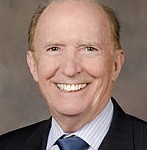
Robert E. Hunter served as US ambassador to NATO (1993-98) and on the National Security Council staff throughout the Carter administration.
Iran Talks: Days Dwindle Down to a Precious Few
EXTRACT
The United States and Iran have some complementary if not coincident interests that call for, at least, clear thinking in Washington about what might be possible – and what should be tested – in improved relations. Both countries want stability in Afghanistan: Iran because of the neighborhood, the US in hopes that it will not have to admit, after 14 years of trying, that the government it supports in Kabul is not likely to prevail over the Taliban once Western forces depart. Both countries want freedom of the seas and security for the Straits of Hormuz. Both want, in President Obama’s words, to “degrade and ultimately destroy” the Islamic State (ISIS or IS). Iran is more whole-heartedly committed to that objective and is more useful to the United States than are regional Sunni states, notably Saudi Arabia, whose people have done so much to inspire, fund, and thus arm the various Islamist terrorist groups. And although the US and Iran have different views about Iraq’s longer-term political orientation, they do share a form of devil’s bargain in Syria. Neither wants the regime of its president, Bashar al-Assad, overthrown: Iran because of the tactical if not strategic value it sees in this Alawite (Shia) regime and the US because of President Obama’s correct fear that getting rid of Assad, without a clear path to a stable future, would be a fool’s errand. Washington says otherwise, but its true policy is obvious.



